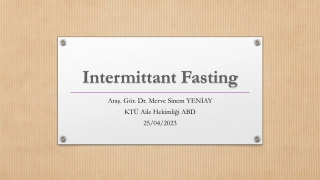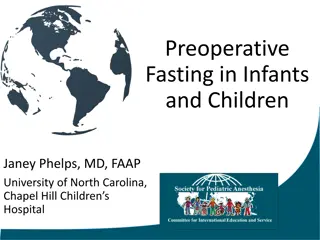Fasting
Fasting, a spiritual practice embraced in various faith traditions, fosters connection with the divine through self-discipline and prayer. This excerpt showcases the significance and benefits of fasting as depicted in religious scriptures and teachings, emphasizing its value in seeking God's will and expressing devotion.
Download Presentation

Please find below an Image/Link to download the presentation.
The content on the website is provided AS IS for your information and personal use only. It may not be sold, licensed, or shared on other websites without obtaining consent from the author.If you encounter any issues during the download, it is possible that the publisher has removed the file from their server.
You are allowed to download the files provided on this website for personal or commercial use, subject to the condition that they are used lawfully. All files are the property of their respective owners.
The content on the website is provided AS IS for your information and personal use only. It may not be sold, licensed, or shared on other websites without obtaining consent from the author.
E N D
Presentation Transcript
https://www.youtube.com/watch?v=s22bjV9SBhI Bahai Fasting - Elika Mahony
1 Say: God sufficeth all things above all things ,and nothing in the heavens or in the earth but God sufficeth. Verily, He is in Himself the Knower, the Sustainer, the Omnipotent. - The B b
2 We have commanded you to pray and fast from the beginning of maturity; this is ordained by God, your Lord and the Lord of your forefathers. He hath exempted from this those who are weak from illness or age, as a bounty from His Presence, and He is the Forgiving, the Generous. - Bah 'u'll h, The Kit b-I-Aqdas, p. 11
3 Both the Old Testament and New Testament teach the value of fasting, which is abstaining from food or drink in order to focus on prayer and seeking God's will. Fasting is mentioned over 70 times throughout Scripture. In the Old Testament, there were two types of fasting: public and private. Both types offer great spiritual benefits. Meg Bucher
4 Thou seest, O God of Mercy, thou Whose power pervadeth all created things, these servants of Thine, Thy thralls, who, according to the good-pleasure of Thy will, observe in the daytime the fast prescribed by Thee, who arise, at the earliest dawn of day, to make mention of Thy Name, and to celebrate Thy praise, in the hope of obtaining their share of the goodly things that are treasured up with the treasuries of Thy grace and bounty. - Bah 'u'll h, Gleanings, p. 299
5 Fasting is difficult, but it is the very fact of its difficulty that gives us the opportunity to connect to God in a stronger way. The sublimation of our own desires to eat in favor of the directive to fast is itself an offering. In addition, harnessing the emptiness that fasting engenders to bring about a deeper level of repentance, along with the sacrifice that we can "offer" to God, makes fasting a precious opportunity for connecting ourselves with God's will. (by Aliza Bulow) A Rabbi
6 Ye had written of the fasting month. Fortunate are ye to have obeyed the commandment of God, and kept this fast during the holy season. For this material fast is an outer token of the spiritual fast; it is a symbol of self-restraint, the withholding of oneself from all appetites of the self, taking on the characteristics of the spirit, being carried away by the breathings of heaven and catching fire from the love of God. - 'Abdu'l-Bah , Selections from the Writings of 'Abdu'l-Bah , pp. 69- 70
7 Fasting is a moral and spiritual act where the aim is to purify the body and mind to acquire divine grace. Most Hindus will fast to: Increase God consciousness or become closer to God. Cleanse and purify the mind and body. Participate in life cycle sacraments called sa sk ras. Celebrate festivals or holy days. Counter negative forces during inauspicious occasions. Civil Service Hindu Connection
https://www.youtube.com/watch?v=QH4Nv1Qctfk&list= PL8AXzEDG1Ef75BuKwqxJjXsL7SlKrmIMn&index=3 We Place You, On the Highest Place
8 The fasting period, which lasts nineteen days starting as a rule from the second of March every year and ending on the twentieth of the same month, involves complete abstention from food and drink from sunrise till sunset. It is essentially a period of meditation and prayer, of spiritual recuperation, during which the believer must strive to make the necessary readjustments in his inner life, and to refresh and reinvigorate the spiritual forces latent his soul. - Shogi Effendi, From a letter written on behalf of Shogi Effendi, January 10, 1936: Bah ' News, No. 98, March 1936, p.1
9 Fasting is illumination, prayer is light. - Qur' n 67:12
10 Fasting and obligatory prayer constitute the two pillars that sustain the revealed Law of God. Bah u ll h in one of His Tablets affirms that He has revealed the laws of obligatory prayer and fasting so that through them the believers may draw nigh unto God. - Bah 'u'll h, The Kit b-I-Aqdas, # 16
11 Fasting is one of the five pillars of Islam. There is also a verse in the Quran that prescribes fasting for all Muslims who are mature and healthy enough to do so for the full day. So Muslims fast as an act of worship, a chance to get closer to God, and a way to become more compassionate to those in need. Fasting is also seen as a way to learn patience and break bad habits. Aljazeera News, 4/20/2020
12 One wisdom is that fasting is conducive to spiritual awareness. One s heart grows more tender, one s spirituality is increased, and as a result one s thoughts become purely focused on the remembrance of God. Such awareness and awakening leads inexorably to spiritual progress. Talks given by Abdu l-Bah in Akk
13 In Buddhism, fasting is recognized as one of the methods for practicing self-control. The Buddha advised monks not to take solid food after noon. Lay people who observe the eight Precepts on full moon days also abstain from taking any solid food after noon. In Buddhism, fasting is an initial stage of self-discipline to acquire self- control. In every religion, there is a system of fasting. By fasting and sacrificing a meal once a day or for any period, we can contribute our food to those who are starving or who do not have even a proper meal each day. Jayesh Maheshwari
14 Another wisdom is this: There are two kinds of fast: material and spiritual. The material fast consists in abstaining from food and drink, that is, refraining from satisfying the physical appetites. But the true and spiritual fast is for man to forsake covetous desires, heedlessness, and evil and animalistic attributes. The material fast is therefore a symbol of that spiritual fast. Talks given by Abdu l-Bah in Akk
https://www.youtube.com/watch? v=41XZBcqfTJo&list=RD41XZBcqfTJo&start_radio=1&t=71 Ramadan | Royalty Free Music























